Imagine a full working week where you worked only your set hours. You clock in at your set start time and out by your set end time. Your employer supports your need for a challenge whilst also being conscious not to overload or overwork you. Your team celebrates successes and birthdays and there are monthly lunches for socialisation and team building…
For many of us this is just a fantasy, but are we truly asking too much of our employers to honour the hours contracted and for them to support us in taking care of our mental health? To strive for minimal work stress and a balance between home and work, irrespective of our relationship status or family demands?
Ekas surveyed Australians from a variety of fields from education and childcare, to retail and hospitality, to healthcare and medicine, to government, I.T and many more to understand what contributes to job satisfaction and how our working lives have evolved.
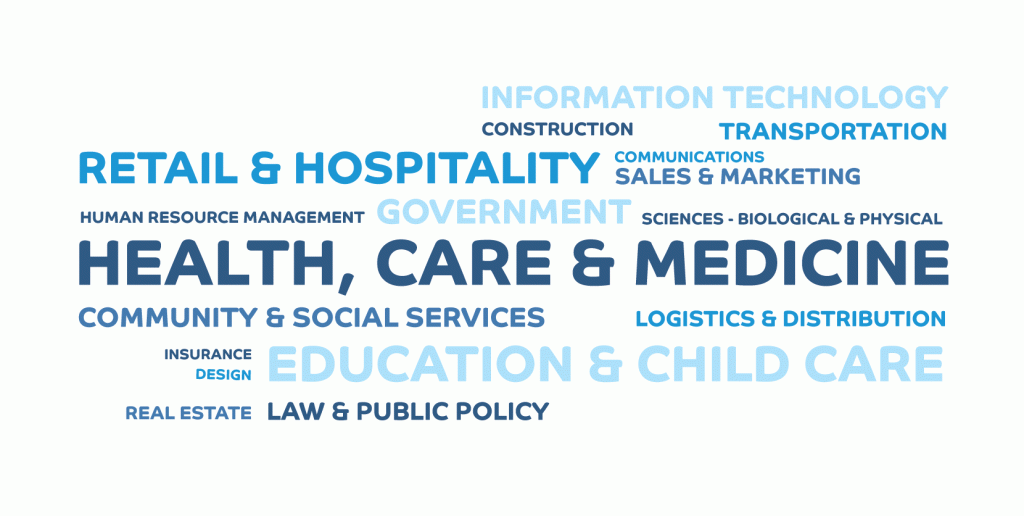
Is just satisfied what we want for our employees?
A majority of Australians (70%) are satisfied with their role but of these only 18% are ‘very satisfied’. This results in over half of Aussies as just ‘satisfied’ with their current roles and employers may want to consider if this is enough to hold on to precious staff retention.
Those who are ‘very satisfied’ were 6.5 times more likely to strongly agree that they enjoyed all aspects required of their role in comparison to those who identified as simply ‘satisfied’. Interestingly those who are ‘very satisfied’ experience a sense of fulfillment and a positive contribution to mental health from their working lives (74%) compared to those who were ‘satisfied’, with only 38% stating their work contributed positively to their mental health.
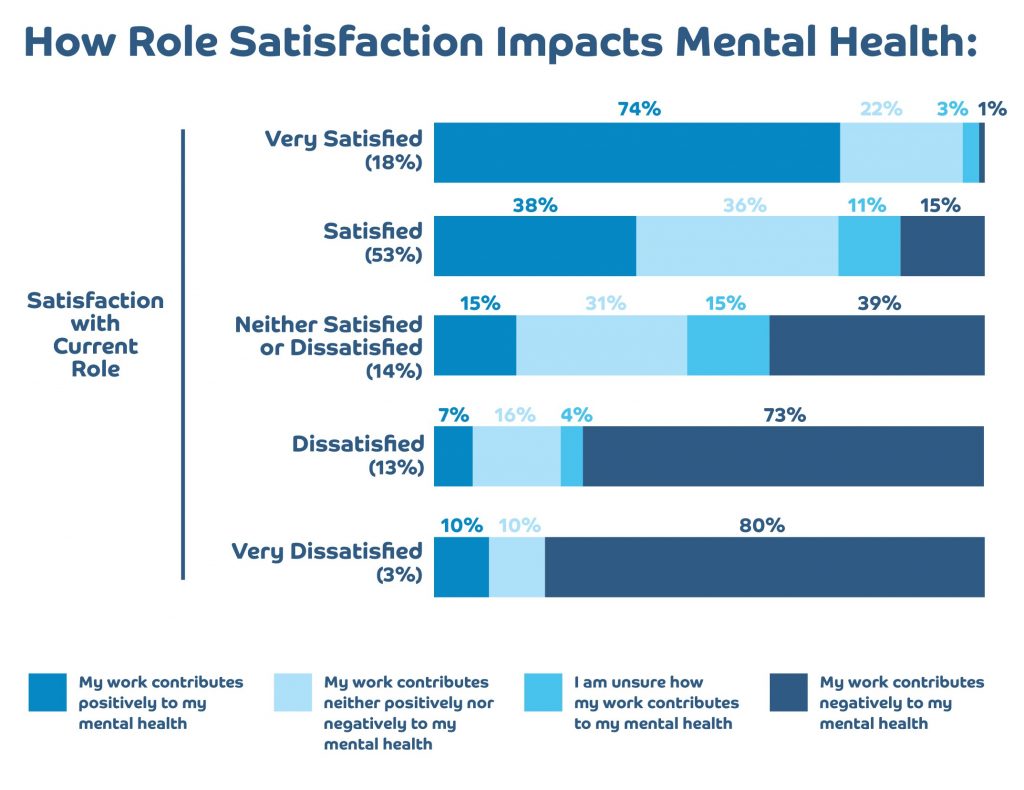
Satisfied as they may be feeling, when we asked working Australians if, in theory, they were able to change jobs (to earn the same amount, in a role of interest to them but with a different employer), nearly half (48%) said they would do so!
But if generally satisfied, what’s driving the desire to jump ship? For most, it was simply the feeling of needing a change (50%), or that they are no longer interested in what they do (29%). Incredibly, this feeling was consistent across respondents of all career stages, from entry level, to senior executive.
“My workplace has a great culture, I am satisfied with my team and my manager, however I feel like I am not progressing in my role” – a respondent describes. With duties becoming increasingly automated by technology, and with the change to varied workplaces, employers may need to rethink how they are going to reinvigorate the employee experience.
Of course, other critical factors were provided by employees when considering why they would leave their current job. Work-life balance was cited as a main reason for wishing to change jobs for 28% of Australians surveyed as they aren’t able to achieve a balance at their current workplace. When looking at those who on a scale of 1 – 10 (where 1 is no balance and 10 is a perfect balance), score their current work-life balance an 8 – 10, 25% would change jobs compared to 74% who scored less than 8.
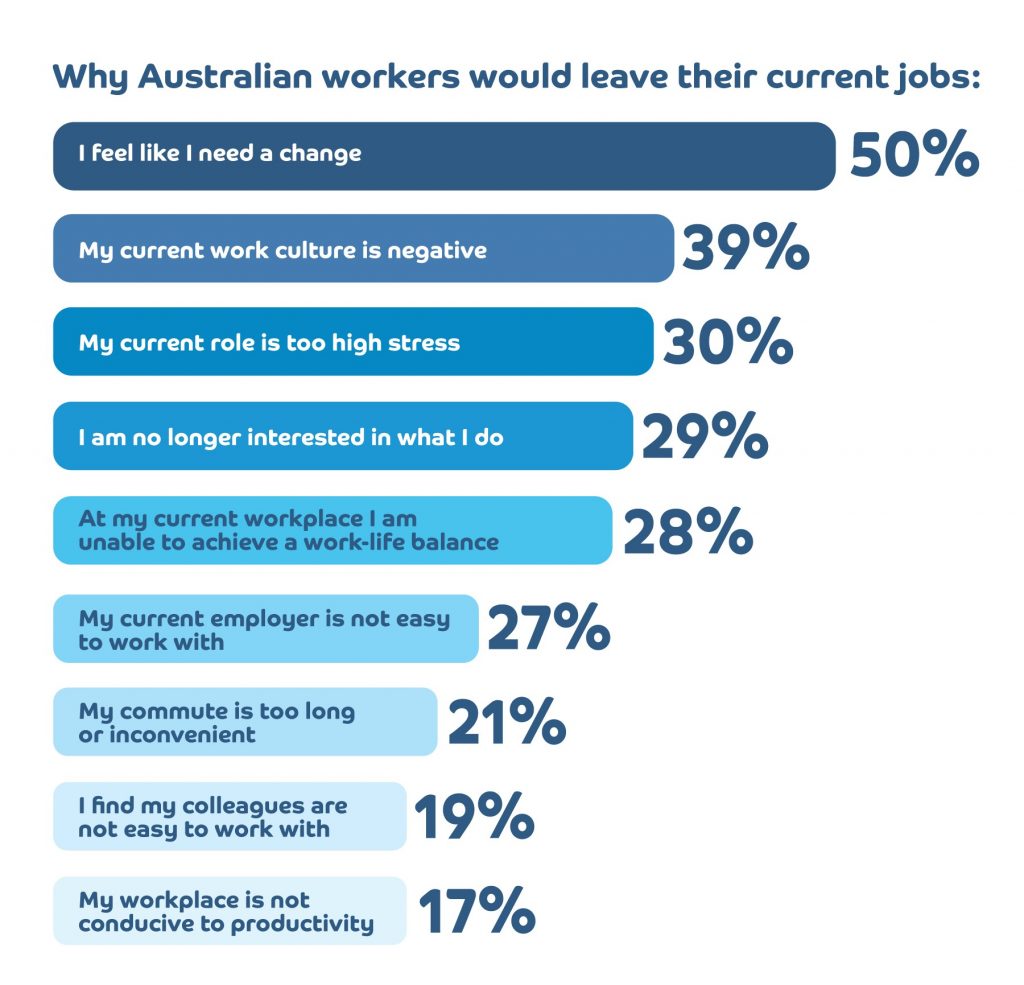
Confidence to be an effective team member
Imposter syndrome (IS) when applied to the working world refers to an internal experience of believing that you are not as competent as others perceive you to be. It can be described as a feeling of pretending to have the skills required to effectively execute your job or role. Nearly half of Australians (48.3%) identified they have felt like this some or all of the time in their job. So what does this mean for the employer and employee relationship…
Those who identify as having experienced imposter syndrome identify as less likely to feel comfortable in their role and are more likely to have their ability to do their job correctly affected by work stresses and pressures. Should employers be doing more to understand employees needs in terms of upskilling and confidence building to bridge the gap between “I think I can” and “I know I can”?
82% of Australians surveyed agree they are comfortable in their role with 25% strongly agreeing. Similarly 85% agree that they feel their skills meet their role requirements, however just over a third (34%) show a high level of confidence in their skills, stating they strongly agree.
As expected, Australians in Mid-Level, Senior or Executive level roles (42%) are more likely to strongly agree that their skills meet their role requirements than their colleagues in entry level and intermediate roles (27%). They are also less likely to identify as having experienced imposter syndrome with 43% of Mid-Level, Senior or Executive having experienced IS compared to 58% of Entry Level or Intermediate workers. Important to note, gender appears not to impact on this self-perception of competence however age does, with those who are older gradually showing an increase in their confidence in their role and capabilities.
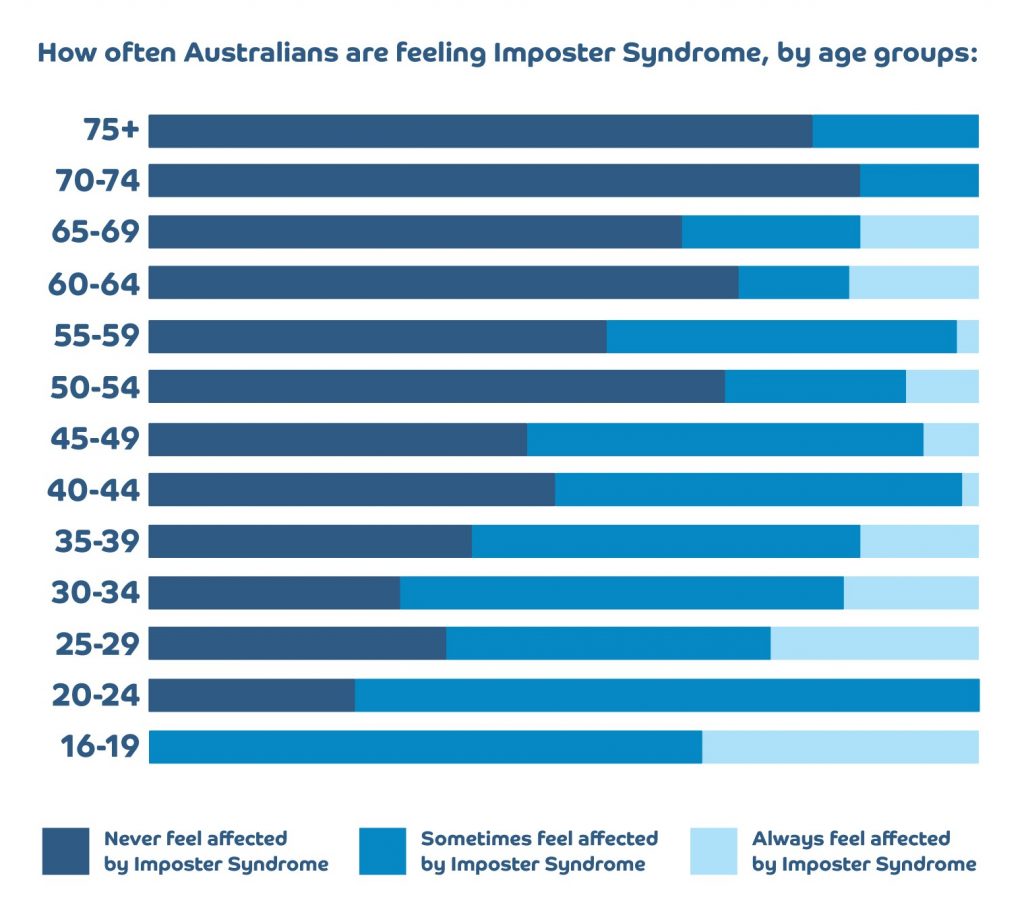
Is it the skills and experience over time that help employees realise their potential and abilities or is it the reassurance of their employer? What can be done to help entry level workers build their confidence to enable them to feel as a contributing effective team member? These are questions that employers need to consider and ask themselves in order to retain their employees.
With working from home becoming an increasing norm for employees, creating a distance between colleagues and removing incidental learning/team discussion, employers need to re-evaluate their approach to building individual confidence in their role and capabilities by looking at ways to acknowledge their skills and offer opportunities for continued training, peer-learning and development.
How Does WFH Weigh-Up With In-Office Productivity?
Much has changed in the past year in terms of how we operate in and feel about our jobs. Unforeseen were the effects that Covid-19 would sweep across all industries and workplaces, in all regions of the world. Adaptation was frenzied at best, and for those that remained employed in their pre-Covid roles, did the change result in positive or negative outcomes?
For many of the Australians who hold office-based roles, their original working routines are likely changed, in fact some 42% of Aussies surveyed by EKAS are currently working from home in some capacity, the majority of whom are doing so since Covid (72%). Of those in this position, around a third are still visiting the office 3-4 times a week (32%) and another third are going 1-2 times per week (33%). The remaining third are heading in once a fortnight or less.
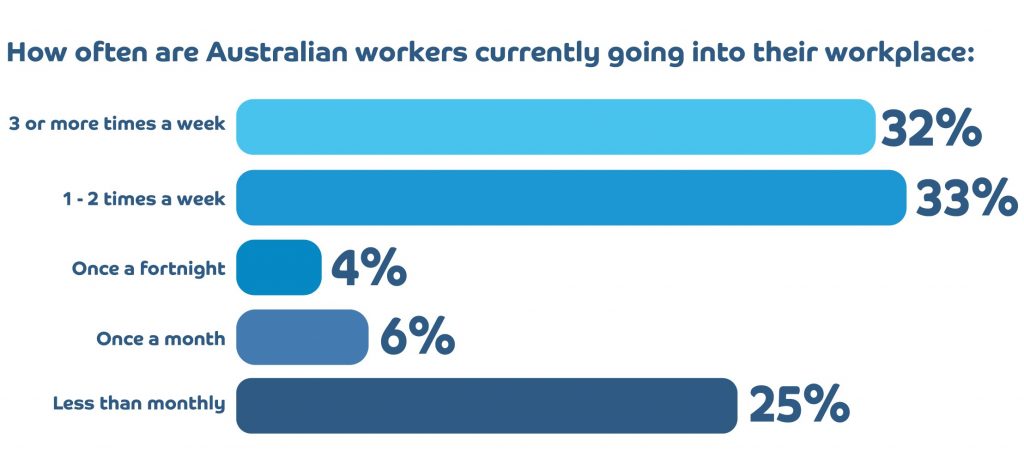
Not only are work-from-home policies potentially saving companies in expensive office rentals, most Aussies working from home say that the changed circumstance does not make it any harder to complete their work or duties (80%), making a compelling argument to continue with the work-from-home structure where possible.
The change in location of desks has amplified an already growing trend of communication through technology. For a huge number of working Australians, technology is used to communicate in replacement of face to face interaction (64%). For most, the use of technology is believed to improve their workplace productivity (68%), and two thirds feel that the use of technology has even improved communication between colleagues (66%). However, there are 31% of workers that believe technology is being used excessively in the workplace to the point colleagues are becoming more disconnected on a personal level with a further 29% on the fence neither agreeing nor disagreeing.
Is the use of direct messaging, calls and emails removing the need for small talk, quick questions and brainstorms, and discouraging casual support mechanisms in order to only interrupt colleagues with pressing tasks? One respondent articulated that employers needed to “ease [the pathway] of communication when we need support and help”.
Water Cooler Conversations May Be a Thing of the Past…
Teamwork is one such function that is still a strong focus for employers in 2021, with 57% of Aussie workers participating in regular team meetings. But while there may be a great number of employers who encourage a culture of teamwork and communication – 47% of workers said that this was true of their workplace – in the post-Covid age of technology this may prove a challenge to maintain in the long-term.
Currently, only a quarter of working Australians are having regular team lunches or meals, and few are undertaking social team building exercises (20%). Even special occasions such as staff birthdays are only being celebrated at 41% of workplaces. As one respondent expressed, their role “could be more interesting and varied with more social interaction”.
Even accomplishments in the workplace are becoming less celebrated with only 29% of Australians surveyed stating individual accomplishments are celebrated in the workplace and team accomplishments not much further ahead at 35%.
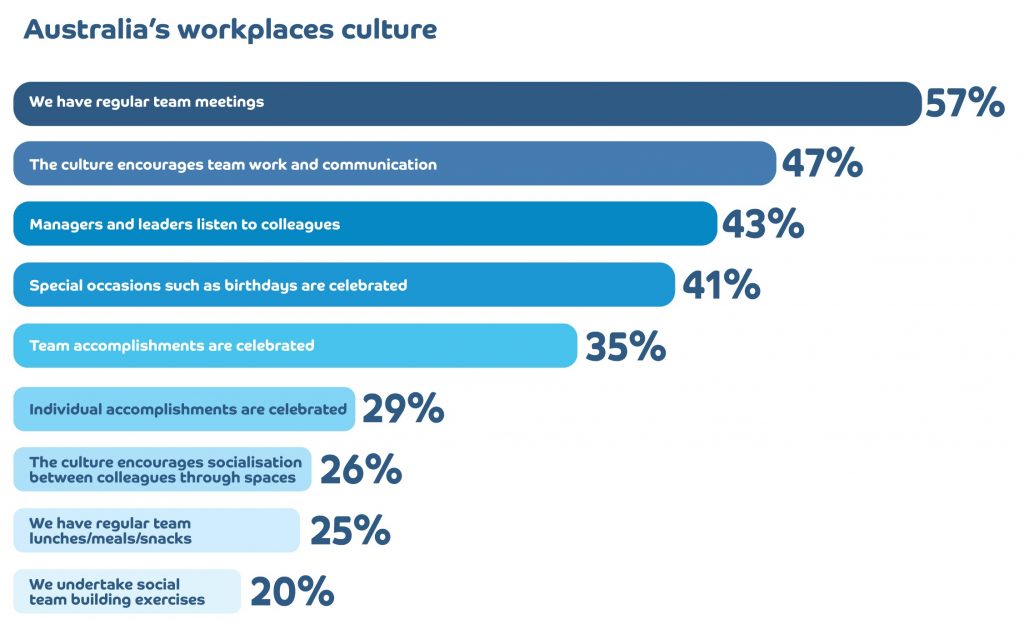
Stressed and Overworked.
Awareness of the effects of job stress has been on the rise for some time, and the World Health Organisation officially declared it an ‘occupational phenomenon’ in June 2019. Commonly thought as being impactful for both individuals, as well as overall company success, employers face increased pressure to measure KPI’s that relate to their workers’ feelings. So how much emphasis are Australian employers putting on mental health and stress?
Just over a third of working Aussies reported that their workplace places a lot of importance on mental health (36%), and thankfully a large portion of employers are also putting some attention to it (49%). However, 30% of Aussies say that their workplace places zero importance on ensuring their employees are not overworked, and alarmingly 27% report they do not have a HR person or team to contact in the event of a workplace issue.
As one respondent describes on behalf of many, often employees are after either compensation or an end to ongoing overtime – “Just notice the amount of overtime I’m doing and either reward me for it or stop expecting it on a weekly basis”. In fact many report that they just want the work to be more fairly distributed between the team. A far cry from the perfect work-life balance.
Common sense dictates that tired, stressed employees equate to less effective employees, and indeed, 57% of working Aussies believe that the stresses or pressures of doing their job correctly affect their ability to work at their best. Often workload and job stress is observed by an employee’s direct manager or leader, so could employers be doing more to avoid burnout and improve productivity?
Of the Australians surveyed, while most say that they get along well with their boss or team leader (88%), far fewer feel that their superiors actively help to reduce their work stress (44%). And while many report that their wants and needs as an employee are taken into consideration (59%), less said that their boss or team leader listens to their staff (43%).
Pulling-A-Sickie For A Rest
Some responsibility for achieving a work-life balance falls to the employer, and some to the employee according to the majority of working Australians (64%). One such method that some employees are using to regulate their stress and find that balance is through sick leave -1 in 4 workers declaring that they have taken a sick day simply because they needed to rest.
Additionally, 18% have called in sick to “take time out for themselves” and 23% have taken a sick day just to have a mentally relaxing day. Some have taken a sick day simply because their workload was too high and they needed a break (13%), whilst for many, a sick day is the opposite of stress reducing, expressing that it can be easier not to as that would lead to having more work to do when they return (27%).
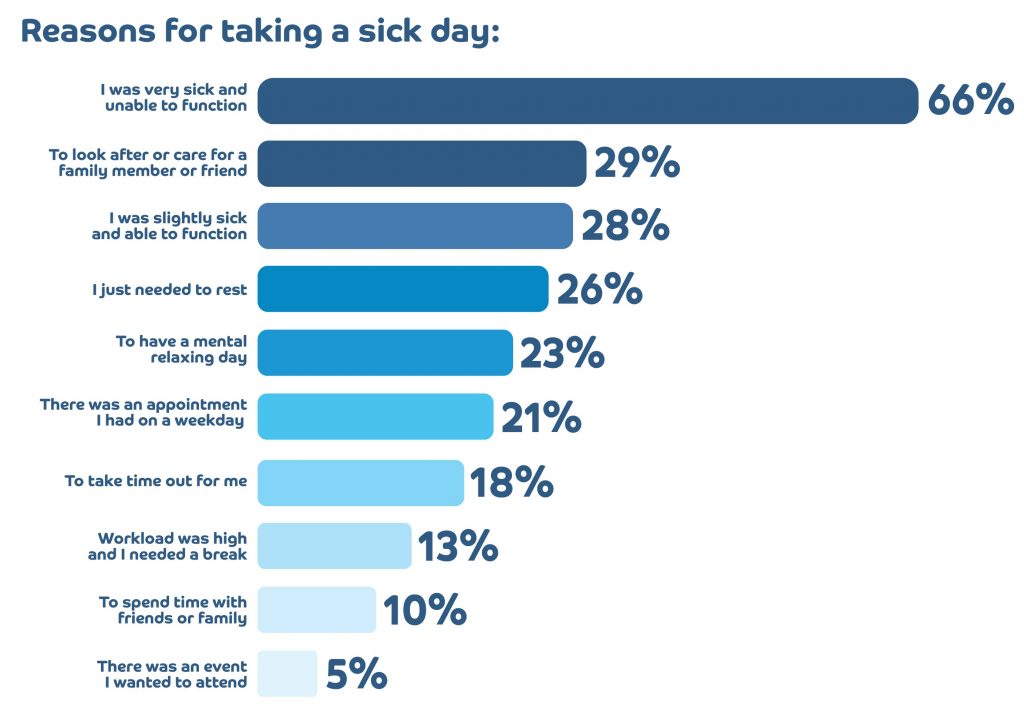
Employees Today, Tomorrow and Beyond…
When asked what their workplace could offer them to help achieve a greater balance within their work/life, one of the most common answers Australian workers gave was to continue or reinstate work-from-home policies, or provide flexible arrangements in general.
The other most common suggestions were workload stress related, with many feeling let down by their employer or management’s action towards employee well-being and support. “Actually follow up on what they promote (e.g. R U Ok?), be approachable and listen to staff with respect” one respondent proposes, while another suggests to “bring in a culture of only working your set hours most of the time”.
It seems important to also foster a culture that aligns with the moral grounds of the majority, with more than half of Australians stating that their beliefs and ethics affect where they work or would consider working (56%). Additionally, 45% say their stance on environmental awareness affects where they work or where they would consider working – with this being much more likely for those aged under 50.
Employers will no doubt need to continue their focus on employee satisfaction, as well as adjust their offerings to prospective and existing employees in a post-Covid world.
Australians have shown that they expect balance and fulfilment from their jobs and are not afraid to go searching for it.
Ekas surveyed 713 working members on it’s panel Select Opinion Leaders in February 2021.
